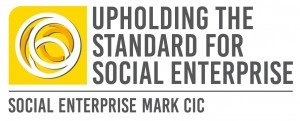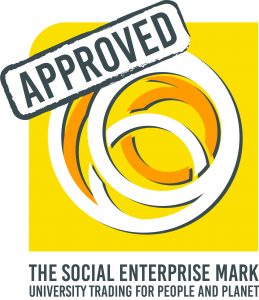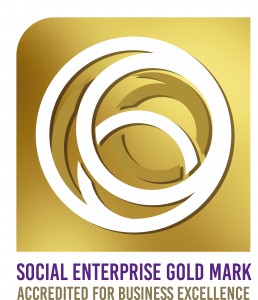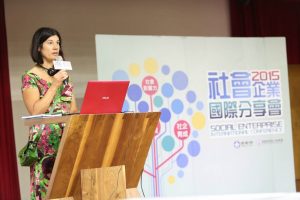Providing credible standards for social enterprise
Lucy Findlay blog for the Regulator of Community Interest Companies
Upholding the standard for social enterprise
 For more than 7 years, Social Enterprise Mark CIC (and formerly RISE, the umbrella body that supported social enterprises in the south west of England) has acted as an arbiter of robust social enterprise standards. Since our inception back in 2010, we have endeavoured to ensure the social enterprise business model remains ethical, credible and commercial, through independent accreditation. As well as providing a single recognisable ‘identifier’ for genuine social enterprises, which are externally assessed against sector-agreed criteria, we work to promote the capabilities of social enterprises as a credible alternative to more ‘mainstream’ business models.
For more than 7 years, Social Enterprise Mark CIC (and formerly RISE, the umbrella body that supported social enterprises in the south west of England) has acted as an arbiter of robust social enterprise standards. Since our inception back in 2010, we have endeavoured to ensure the social enterprise business model remains ethical, credible and commercial, through independent accreditation. As well as providing a single recognisable ‘identifier’ for genuine social enterprises, which are externally assessed against sector-agreed criteria, we work to promote the capabilities of social enterprises as a credible alternative to more ‘mainstream’ business models.
We provide two accreditation ‘marks’, which assess applicants against robust qualification criteria to provide an independent guarantee of their commitment to creating benefits for people and planet, through the trade of goods and services.
The Social Enterprise Mark is the only internationally available social enterprise accreditation, enabling credible social enterprises to prove they put the interests of people and planet before shareholder gain. The Mark acts as an independent, externally assessed guarantee that a business is operating as a true social enterprise, with the central aim of using income/profits to maximise social benefit, which takes precedent over generating dividends for owners/shareholders.
 The Social Enterprise Gold Mark is a unique enhanced accreditation for social enterprises wishing to demonstrate their excellence, assessing three essential areas of business operations:
The Social Enterprise Gold Mark is a unique enhanced accreditation for social enterprises wishing to demonstrate their excellence, assessing three essential areas of business operations:
- Governance – stakeholder representation in strategy and operation
- Business ethics – complaints handling, diversity, equality, pay, workplace issues and social auditing
- Social impact and financial transparency – how income and profits are used to create added social and environmental impact
The accreditation focuses on measuring what makes a social enterprise excellent, and how they can continue to improve their impact. Successful applicants receive an individually tailored action plan for continuous improvement, in line with guidelines of best practice.
Community Interest Companies – the perfect fit for social enterprise
 Although there is no single legal structure for social enterprise, the Community Interest Company (CIC) model was specifically designed with social enterprises in mind. It aimed to bridge the gap between standard commercial businesses and charities, recognising that some businesses wanted to provide some benefit to the community through their commercial activities but without the regulation and restrictions which come with being a registered charity.
Although there is no single legal structure for social enterprise, the Community Interest Company (CIC) model was specifically designed with social enterprises in mind. It aimed to bridge the gap between standard commercial businesses and charities, recognising that some businesses wanted to provide some benefit to the community through their commercial activities but without the regulation and restrictions which come with being a registered charity.
CICs automatically meet most of the criteria covered by the Social Enterprise Mark. Over ¼ of our network of accredited social enterprises are registered as CICs and we certainly view the CIC model as a favourable one in terms of assessing eligibility for accreditation.
Broadening horizons – looking to the future
As a recognised and established social enterprise accreditation authority, we are increasingly broadening our horizons, both in terms of engaging with new markets and in expanding our offer internationally.
Over the last year, we have become increasingly engaged with the Higher Education sector, with several HEIs showing an interest in proving their commitment to using profits to create benefits for people and planet. This is an encouraging development, as it symbolises a commitment to creating social change, for which such institutions have a huge potential scope to achieve, given their size.
There are now 8 HEIs which hold Social Enterprise Mark/Gold Mark accreditation, with Plymouth College of Art, The University of Northampton, and The University of Winchester recently being awarded the Social Enterprise Gold Mark at our conference in June.
We have also seen a growing interest in social enterprise at an international level, and strive to be the global champion for credible standards for social enterprise. Following the approval of UAE based C3 as the first international Social Enterprise Mark holder in April 2015, there are now 6 organisations outside the UK that have been awarded the Social Enterprise Mark, including FLOCERT (the global certification body for the Fairtrade Mark) and the Network of Asia and Pacific Producers (the network of Fairtrade certified producers in the Asia Pacific region).
 As well as welcoming applications from social enterprises across the world, we offer international consultancy services, to advise global counterparts looking to set up equivalent social enterprise accreditation schemes within their own countries. For example, in March 2016, we were approached by the British Council and invited to China to advise on the development of a Chinese social enterprise accreditation system, and in 2015 I was invited by the Taiwanese government to speak about the Social Enterprise Mark at the International Social Enterprise Conference.
As well as welcoming applications from social enterprises across the world, we offer international consultancy services, to advise global counterparts looking to set up equivalent social enterprise accreditation schemes within their own countries. For example, in March 2016, we were approached by the British Council and invited to China to advise on the development of a Chinese social enterprise accreditation system, and in 2015 I was invited by the Taiwanese government to speak about the Social Enterprise Mark at the International Social Enterprise Conference.
So, in summary, we have bold ambitions to continue to develop our position as the global champion of credible standards for social enterprise!
This blog was originally posted on the Office of the Regulator of Community Interest Companies blog on Friday 8th September 2017.



